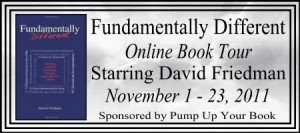Is organizational culture just a New Age obsession that distracts us from the real work of business? What role do values play in organizational success? How can we create greater consistency between the values we say are important and the ones that actually show up in the routine behavior of our people? What’s the most important common denominator found in all dysfunctional organizations, and how can we avoid it?
In his new book, Fundamentally Different, David Friedman provides the answers to these questions and more. You’ll learn:
• The 8 keys steps the most successful companies use to institutionalize their values
• Why listening can actually have more impact than speaking
• What a “filter” is and how it affects everything we believe to be true
• The 5 components of good decisions
• The role of curiosity in increasing effectiveness
• Why “rebar” is the key to creating lasting change
With his compelling logic and easy-to-understand style, David shares the most important insights he learned during a 27-year business career in which he led one of the most unique and successful companies in his industry. Captured in his self-styled Fundamentals, this collection of wisdom is so simple, yet powerful, that you’ll wonder why the principles he describes aren’t more commonplace in every organization across America.
But David’s Fundamentals aren’t just about business. They’re a guidebook for life. And like so many other people who’ve already embraced them, you’ll no doubt find your life enriched by their practice.
Don’t Collaborate on Values By David Friedman
When I work with leaders who want to create a high-performance culture, they naturally want to know where to begin. And the answer is—with values.
Values are the cornerstone of organizational culture because our behavior is a reflection of our values. In fact, you can best understand the culture (and operating values) of any organization simply by watching how its people behave. If you want to change behavior, start with values. The highest performing companies know this and they take steps to institutionalize their most important values.
One of the biggest misconceptions about values development is that it should be a collaborative process. Some leaders think that they should survey their people and build consensus around what the organization’s values should be. They try to write mission statements and values that will look good on a poster or in their annual report, but all too often these statements lack any meaningful personal investment. These efforts are, in fact, misguided.
The development and sponsorship of organizational values is one of the essential roles of leadership. It’s the leader’s responsibility to stipulate the values that will drive the organization toward success. Not only is the leader the primary author/architect of the organization’s values, but he/she is also the chief example and cheerleader for those values. This is why it’s so critical that the leader be personally invested in them.
Not surprisingly, many leaders have difficulty articulating the values they want to use to lead their organizations. My counsel is to look inward, rather than looking outward. In other words, think about the values that are most meaningful to you. I’ll often ask leaders, “What do you care most about? What are your strongest beliefs about how people ought to be, or about how work ought to be done, or about what you want your company to be known for?” Chances are there are already many things you’re always telling people along these lines. This is a pretty good starting point when identifying values. The key is to notice the values you already believe strongly in, as opposed to trying to craft a politically correct statement of someone else’s values.
In my book, Fundamentally Different, I share some additional thoughts on how to write your values in a way that is most helpful in the effort to institutionalize them, and ultimately, to create a high-performance culture.
How does a philosophy major with virtually no finance, marketing, or management education go on to become an award-winning business leader?
To understand that, you have to understand David Friedman’s approach to life. While he’s always been known for his discipline and his relentless work ethic, what sets David apart, more than anything, is his curiosity and his philosophical nature. He’s a student of business, and of life. Quite simply, he’s a thinker. And that thoughtfulness has influenced his entire career.
“I never felt my lack of formal business education was a limitation,” says David. “I always thought of it as an asset. Not being saddled with traditional thinking, at every stage of my career I felt free to follow my instincts – even when it led to what some might consider to be unconventional approaches.”
From the beginning, David saw RSI not as an insurance agency, but as a generic customer service business. He was curious to learn what made a service organization great and he was quick to apply what he was discovering. Under David’s leadership, RSI became the standard by which not only other insurance agencies were measured, but service companies in other industries as well.
He also became fascinated by leadership and organizational development. From Open Book Management to The Collaborative Way, David developed a deep appreciation for the power of organizational culture. While he may have had an instinctual knack for leadership, it was his philosophical nature that prompted him to search for underlying principles he could more easily teach to those around him.
In fact, David is a natural teacher. He has a remarkable ability to explain even the most difficult concepts in ways that anyone can easily understand. Ever the philosopher, David not only sees the subtleties and nuances of complex issues, but he has a true gift for communicating his insights with amazing clarity. His recent book, Fundamentally Different, is perhaps the greatest testament to this gift. As you read it or listen to it, you’ll no doubt see both the philosopher and the teacher at his best.
Visit the author online at www.djfriedman.com or www.Fundamentally-Different.com. You’ll find his blog at http://djfriedman.com/blog/.



















No comments:
Post a Comment